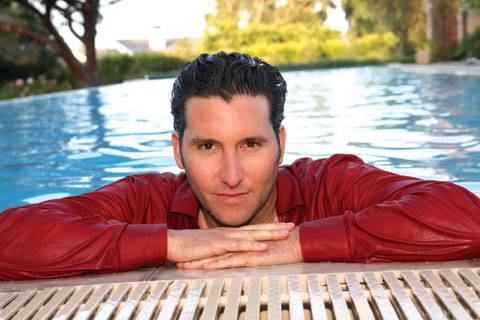Designer Donna Karan shifts her focus from ‘dressing’ people in designer duds to ‘addressing’ them about issues that are close to her heart
By Stephanie Wilson
Photography by Yann Dandois
While the word ‘health’ means “the condition of being sound in body, mind, or spirit” according to Miriam Webster Dictionary, in our country, healthcare, while caring for the condition of the body, tends to neglect that of the mind or spirit. While other cultures have long known the connection between the wellness of mind and spirit in conjunction with that of the body, ours is seriously lagging behind.
The state of our healthcare system is something that has become of importance to world-renowned designer Donna Karan. In recent years, she has learned the significance of making healthcare more, well, caring. It all stems from the tragic loss of her husband Stephan Weiss to lung cancer in 2001. Weiss was Ms. Karan’s partner in the founding of the idyllic fashion company that bears her trademarked name.
Throughout her prolific career, when Karan saw something missing from the marketplace, she filled the void with pioneering products. Her wildly successful Donna Karan New York stemmed from her desire to perfect the simplicity of the bodysuit; DKNY was the answer to her quest for the perfect jeans, along with her desire to dress her daughter Gabby. When she realized that the men in her life—husband Stephan included—also required a sophisticated system of dressing, DKNY Men was launched.
Today, her husband continues to be an inspiration to her, although her focus has shifted. “I suppose I’ve simply gotten to a point in my life where I want to ‘address’ people, not simply ‘dress people,’” she explains in a blog she pens for The Huffington Post about her new cause. Her first step in doing so has been with the founding of Urban Zen, a philanthropy that is addressing nontraditional wellness concepts through various Initiatives. The first Initiative was The Wellbeing Forum, a two-week workshop to explore a new model for wellness and patient care, which took place from May 14 to 24 in Manhattan.
“Everything I do is a matter of heart, body, and soul,” says Karan. The Initiative aims to combine the three in today’s complex healthcare system. Dr. Larry Norton, deputy physician-in-chief for breast cancer programs at Memorial Sloan-Kettering Cancer Center said, “The two historic threads that joined to create what we now term as Western Medicine are the Greek school, which focused on the flow of body fluids and abstract reasoning, and the Arabic-Persian school, which emphasized anatomy and scientific observations. It is now clear that we have much to gain by studying and integrating principles and techniques derived from other cultures into our powerful existing corpus of medical knowledge. Donna Karan’s new Initiative will expand and encourage this dialogue in an environment of openness, creativity, and mutual respect, all for the benefit of our patients and ourselves.”
Karan writes, “When first my husband became ill with cancer, then my best friend Lynn Kohlman, I realized something was terribly wrong with the way they were being treated. I was blessed to see that they both got the best medical care, but even with that, even in the best medical facilities in the country, the disease was being treated, but the patient—that living, breathing, sensitive human being whom I knew and cared for so much—got lost in the process.” Unable to sit by helpless, Karan brought healthy whole foods into the hospital, along with yoga instructors to teach breathing and relaxation. “I encouraged [my husband and Lynn] to connect spiritually so they could become empowered in the healing process. Stephan responded immediately,” Karan shares. Sadly, he eventually succumbed to the illness, but it was after living with the disease for seven years.
Lynn Kholman was only given months to live when she was first diagnosed with both breast and brain cancer, but is still alive today, nearly four years later. “She will tell you it had everything to do with her integrative treatment and her own fierce will and passion to live,” writes Karan.
The Urban Zen Initiative is based on the success of these integrative treatments. The program brought together the best minds and healers from all traditions both East and West in order to help pave the way to making changes in the current healthcare system. The forum unites respected yoga instructors with healthcare leaders, unites nurses with patients and spiritual leaders. “My mission is to create a working environment where the worlds of conventional and alternative medical practices unite to create new ways of healing, health, and well being, focused on the total human and medical needs of the patient,” says Karan.
Karan is the underwriter of the Urban Zen Initiative, along with several corporate partners. One hundred percent of all contributions to the Initiative will support pilot programs that arise out of the Forum’s Workshops, and fifty percent of the tickets were made available free of charge to qualified healthcare professionals. (Ticket prices ranged from $100 for a yoga, Tai Chi or Qigong class to $6,000 for the Healer Sponsorship, which included one ticket to Wellness Launch Party Benefit and 5Rhythms® Trance Dance Benefit, as well as a priority pass to all the Well-Being Forum Workshops and a VIP gift bag.)
Urban Zen Initiative took place at Stephan Weiss’s sculpture studio on Greenwich Street, playing host to a myriad of events all centered around one concept: Health. The program was based on “The Path,” both homage to the Zen concept in Mahayana Buddhism that asserts that enlightenment can be attained through meditation, self-contemplation, and intuition, and an acronym for Patient Awareness Toward Healing.
The event garnered its fair share of celebrity support, with Michael J. Fox speaking on one of the panels that convened daily. Hilary Rodham Clinton was an honorary chair for Urban Zen, while supermodel Christy Turlington was a co-chair. “Donna and I had this discussion about what it was like to have experienced a loved one who was ill, and how hard it is on the people around them, let alone the patients,” Turlington said. “Donna has been a huge example to me. She is now in a place where she can dedicate time, money, and her interest solely on making the world a better place. It’s quite inspiring to be a part of it.”
Each morning of the forum started out with a yoga, Tai Chi or Qigong class, such as The Path Yoga Training Class taught by Rodney Yee and Colleen Saidman Yee. These yoga classes integrated yoga sequence, restorative yoga postures, yogic breathing, and meditation to help the patients in their healing process. This was followed by lively discussions, such as the Open Discussion: ‘The Path’ – Integrative Medicine, which provided a comprehensive overview dealing with the experience of patients and their loved ones as they worked through serious illnesses in today’s medical environment. The discussion was led by leading names in healing, such as Dr. Woodson Merrell, the M. Anthony Fisher Director of Integrative Medicine at New York Beth Israel Medical Center alongside the likes of Professor Robert Thurman, a professor of Indo-Tibetan Studies at Columbia University and director of the Tibet House, and Rodney Yee, a yoga instructor.
These diverse minds led to lively discussions. Dr. Merrell said, “What we hope to achieve is to help make fundamental changes in the way health care is delivered; to make it more integrated than it is now.”
In a taped message, Senator Clinton said, “Our healthcare system is one focused on sickness, not on wellness. Lifestyle issues are central to well-being. We need to develop programs to serve as new models.” The Urban Zen Initiative worked on doing just that.
The main goal of the panels was to inform. It gave attendees and speakers an opportunity to interact and work on problem solving, work towards solutions. Many of the discussions also focused on the support of pilot programs at local hospitals using the concepts discussed throughout the Initiative.
Karan also opened an Urban Zen boutique throughout the duration of the event, which sold Urban Zen clothes, art objects, and books about health and healing, with profits going to help the Initiative. Well-renowned photographers such as Annie Liebowitz, Michael O’Neill, and others also donated works for an auction whose proceeds will be used to help with pilot programs at various medical facilities, such as the Continuum Center for Health and Healing at New York Beth Israel Hospital.
The Well Being Forum is just the beginning of Karan’s philanthropic side. Upcoming forums are in the works that will focus on some of her other passions, such as the preservation of indigenous cultures, and the empowerment of children through spirituality.
When discussing whether the integrative changes will be implemented in hospitals, Dr. Dean Ornish mentioned that no hospital wants to be the first to change, and no one wants to be the last. Karan, always with her keen fashion sense and quick wit, replied, “I’ve seen it happen in fashion; one designer does short skirts, and then everyone’s doing it.” As many people have followed her direction when it comes to fashion, the total wellness trend may catch on sooner than we think.





















